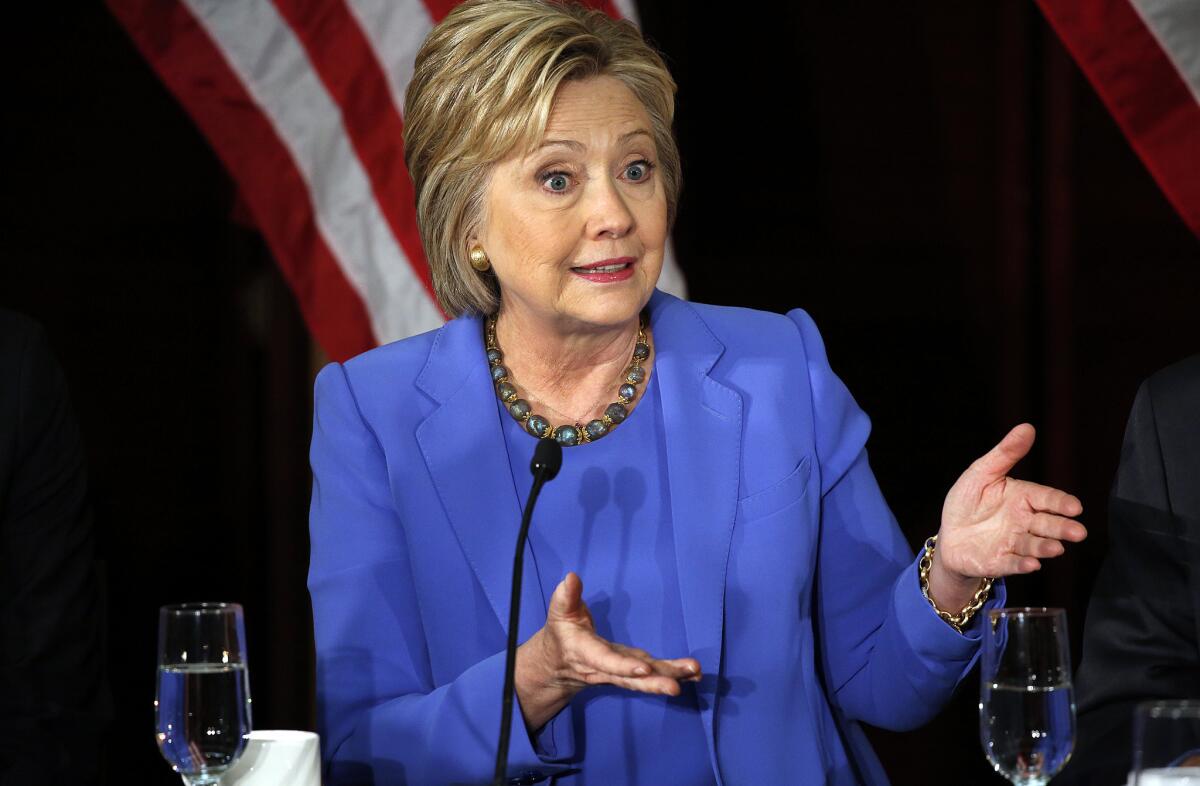Hillary Clinton says Republicans have only themselves to blame for Donald Trump

Hillary Clinton at a forum at USC last week.
- Share via
Reporting from Washington — Republican leaders alarmed by the prospect of Donald Trump as their presidential nominee have only themselves to blame, Hillary Clinton said Monday, seeking to cast the party’s elite as extremists now trying to undercut President Obama’s constitutional obligation to fill out the Supreme Court.
Clinton recalled how the Senate majority leader had once said the party’s primary purpose should be to make Obama a one-term president. She noted that a leading Republican presidential contender, Sen. Ted Cruz of Texas, sparked a 2013 government shutdown in his drive to unravel Obama’s signature health law.
“What the Republicans have sown with their extremist tactics, they are now reaping with Donald Trump’s candidacy,” Clinton said.
Clinton’s comments came in an address on the importance of the Supreme Court as a voting issue, which has taken on greater resonance since the death of its conservative anchor, Justice Antonin Scalia.
Clinton said Senate Republicans’ refusal to consider Obama’s nominee to replace Scalia, Merrick Garland, was “the latest in a long line of actions aimed at disrupting our government and undermining our president.”
Election 2016 | Live coverage on Trail Guide | Track the delegate race | Sign up for the newsletter
“These things are connected,” she said. “Once you make the extreme normal, you open the door to even worse.”
Clinton argued that the chairman of the Senate Judiciary Committee, Sen. Charles E. Grassley of Iowa, was ignoring the voices of tens of millions of voters who cast ballots for Obama in 2012, and called on Grassley to schedule confirmation hearings when the Senate returns from its recess.
But the fight was larger than just the one seat on the high court, Clinton added, noting that by election day in November, two other justices will be at least 80 years old.
Should a Republican president get to appoint multiple justices, she said, it “could demolish the pillars of the progressive movement,” after a period in which the court already had taken a “dangerous turn” by tilting the scales of justice toward the wealthy and powerful.
“At its best, the court is a place where the least powerful voices in our society are heard and protected,” she said, including those of African Americans “fighting for the right to vote,” or women demanding abortion rights in the face of “humiliating laws that would strip that right away.”
Clinton’s address, on the campus of the University of Wisconsin-Madison, was heavy on policy and reflected something of a hybrid strategy – appealing for votes in the state’s competitive April 5 primary while also laying down markers for the general election fight in the fall.
“Conservatives know exactly how high the stakes are,” she said, noting how often Republicans have sought to challenge Obama’s policies in the courts. “As scary as it might be, ask yourselves: What kind of justice will a President Trump appoint? Or for that matter, what kind of attorney general? What kind of lower court judges?”
Clinton actually seemed to promote another Democrat’s candidacy more than her own, that of former Democratic Sen. Russ Feingold, who is running to win back the Wisconsin seat he lost to incumbent Republican Ron Johnson in the 2010 tea party landslide.
She noted that the area where she spoke was demographically similar to those in which rival Bernie Sanders has enjoyed strong support, but that she came to Madison nonetheless because she wanted to “compete for every vote.”
Clinton urged Democrats to understand the high stakes in the election this fall, particularly when it comes to the Supreme Court.
“If we’re serious about fighting for progressive causes, we need to focus on the court,” she said.
She did not indicate whether she would renominate Garland if he were not confirmed by the Senate this year, saying only that she would not “second-guess” Obama’s decision, one she suggested was influenced by the political realities of divided government.
But she did say she would look for judicial nominees who had “broader human experience” beyond legal circles, and even possibly compile a list of potential choices after the primary.
In a statement before Clinton spoke, Grassley dismissed her address as an effort to distract voters from congressional investigations into her handling of sensitive materials as secretary of State.
The statement also listed outstanding questions that the Judiciary Committee has sought answers to involving Clinton’s compliance with the Freedom of Information Act and other federal records laws.
Michael Short, a spokesman for the Republican National Committee, also accused Clinton of hypocrisy on the judicial nomination issue, citing her opposition to the nomination of Supreme Court Justice Samuel Alito and to other lower court nominees of President George W. Bush.
“The only reason Hillary Clinton is calling on Republicans to breach decades of bipartisan precedent of not confirming election year Supreme Court nominees is so she could have a liberal majority on the court to help her carry on President Obama’s legacy of executive overreach if elected,” Short said.
Follow @mikememoli for more news on the 2016 campaign and Supreme Court.
ALSO:
Donald Trump leads in California primary race but threatens a GOP fracture
Clinton email probe enters new phase as FBI interviews loom
More to Read
Get the L.A. Times Politics newsletter
Deeply reported insights into legislation, politics and policy from Sacramento, Washington and beyond. In your inbox twice per week.
You may occasionally receive promotional content from the Los Angeles Times.









